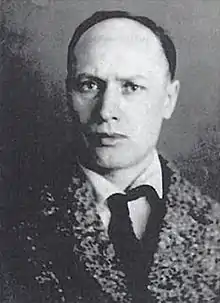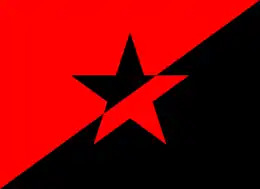Peter Arshinov
Peter Andreyevich Arshinov (Russian: Пётр Андре́евич Арши́нов), also known as P. Marin (Russian: П. Ма́рин) (1886–1937[1]), was a Ukrainian anarchist revolutionary and intellectual who chronicled Nestor Makhno's 1919–1921 uprising.
Peter Arshinov | |
|---|---|
 Pyotr Arshinov. | |
| Born | 1887 Yekaterinoslav, Ukraine |
| Died | 1937 |
Life
Peter Arshinov was born in Yekaterinoslav.[2] In 1904 he become involved with the revolutionary movement. In 1905 he worked as a locksmith in the railway workshops of Kizyl-Arvat (now Serdar in Turkmenistan), where he joined the Bolshevik section of the Russian Social Democratic Party.[3] From here he led the organization of the RSDLP and was the editor of the illegal Bolshevik newspaper Molot. Hiding from the police, he soon returned to Ukraine where he joined the workers at a factory in Ekaterinoslav.[3] In December 1906, after the autumn defeat, he united the militant anarchist survivors of Ekaterinoslav into a terrorist group and organized a series of attacks - including the assassination of a ruthless railroad boss and the bombing of a village police station on 23 December 1906, in which a number of Cossack and police officers were killed.[3]
On the 9th March 1907 he was arrested and condemned to death by hanging by a military tribunal. In 22nd April 1907 he escaped from prison. Arshinov then found refuge in France, venturing to Russia two years later. In the autumn of 1909 he was arrested for spreading anarchist propaganda.[3] He would escape before sentencing and would go onto to participate in underground propaganda work.[3] In May-July 1910 he performed a robbery with fellow anarchists on a wine depot in the village of Filopovo. This would soon lead to his arrest in Austria and subsequent trial in Russia.[3] In October 1911 he was again imprisoned for a 20-year sentence in Moscow's Butyrka prison.[3] There he met fellow convict and anarchist leader Nestor Makhno. They were released seven years later, in 1917, during the February Revolution. While Makhno returned to Ukraine, Arshinov joined the Moscow Federation of Anarchist Groups.[3] Arshinov returned to Ukraine to participate in Makhno's 1919 Makhnovist insurrection, which lasted until 1921.[3]
Arshinov emigrated to Germany in 1922, later moving to France and the United States. In 1923 he published his "History of the Makhnovist Movement",[1] which was used as evidence for defence in the court proceedings against Nestor Makhno in Paris, and helped obtain his exoneration.[4] Arshinov got in contact with Communist leader Sergo Ordzhonikidze, who promised to help Arshinov if he formally broke all ties with anarchism.[5] Arshinov produced two anti-anarchist pamphlets, Anarchism and the dictatorship of the proletariat in 1931 and Anarchism in our age, in 1933, which both gained him notoriety in anarchist circles with Camillo Berneri remarking that he "had not left the movement quietly and with dignity, but had slammed the door behind him like a drunk".[3] After breaking up with anarchism [6] Arshinov returned to the USSR in 1934 with permission of the Soviet authorities. He was arrested in 1937, accused of creation of anarchist underground network, and was summarily executed.
Works
- History of the Makhnovist Movement (1921)
- The Two Octobers (1927)
References
- Graham, Robert, ed. (2005). Anarchism: A Documentary History of Libertarian Ideas. 1. Montreal: Black Rose Books. p. 304. ISBN 978-1-55164-250-5.
- Peters 1970, p. 27.
- "Arshinov, Peter, 1887-1937". libcom. 20 September 2004. Retrieved 30 March 2020.
- "History of the Makhnovist Movement (1918–1921)". revoltlib.com.
- Smele, Jonathan D. (19 November 2015). Historical Dictionary of the Russian Civil Wars, 1916-1926. Rowman & Littlefield. ISBN 978-1-4422-5281-3.
- Alexandre Skirda, "Anarchy Cossack" p.283
Bibliography
Further reading
- Avrich, Paul (1967). The Russian Anarchists. Princeton: Princeton University Press. ISBN 978-0-691-00766-3. OCLC 266518.
External links
- Peter Arshinov, History of the Makhnovist Movement (1918-1921), 1923.
